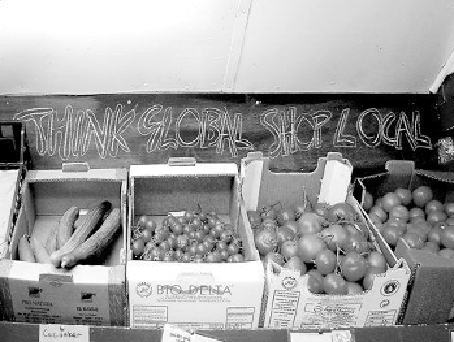Agriculture Reference
In-Depth Information
Chapter 7
Some Questions Answered
Can permaculture feed the world?
One thing is for sure: present day industrial agriculture cannot feed the world for much
longer.
Like almost all economic activity in our culture, it is utterly dependent on fossil fuels and
these will soon become scarce and prohibitively expensive. Along with the consumption of
fossil fuels goes a level of pollution which is equally un-sustainable. Climate change caused
by the burning of fossil fuels is just one form of this pollution. What is more, present meth-
ods of food production, both in the industrialised northern hemisphere and in the peasant
south, are destroying land at a frightening rate.
Soil erosion is an insidious drain on soil fertility in Europe. But when European-style
farming is unthinkingly introduced into other parts of the world it becomes catastrophic. In
the state of Iowa, USA, it has been calculated that for every bushel of wheat produced six
bushels of soil are lost by erosion. A third of the original topsoil on cropland in the United
States is already gone. This is not farming, it is mining the soil.
The spread of deserts has been speeded up both by global warming and inappropriate land
use which includes over-grazing, cultivating unsuitable soils and cutting trees. It has been
estimated that in the past 50 years, 50 million people have become unable to feed themselves
due to desertification and another 400 million have become less able to support themselves.
According to a UN study, about 40% of the world's land is suffering from the effects of
desertification, and the livelihoods of a billion people are threatened.
A third of the world's food is grown on irrigated land. Heavily irrigated land can suffer a
gradual build-up of salt in the topsoil. This happens because the soil surface is frequently wet
and the Sun evaporates the water from the soil leaving an ever stronger solution of salt. The

